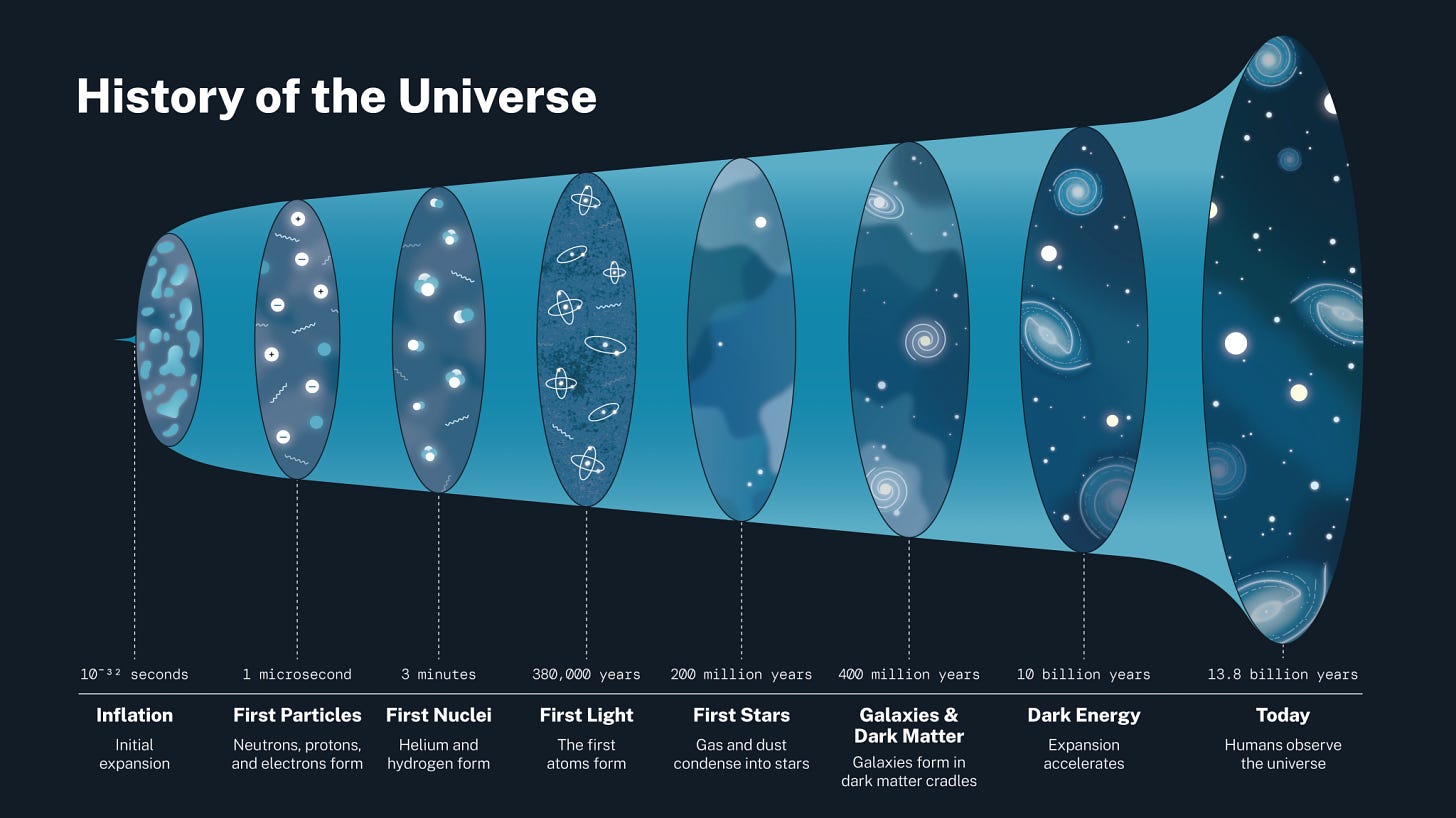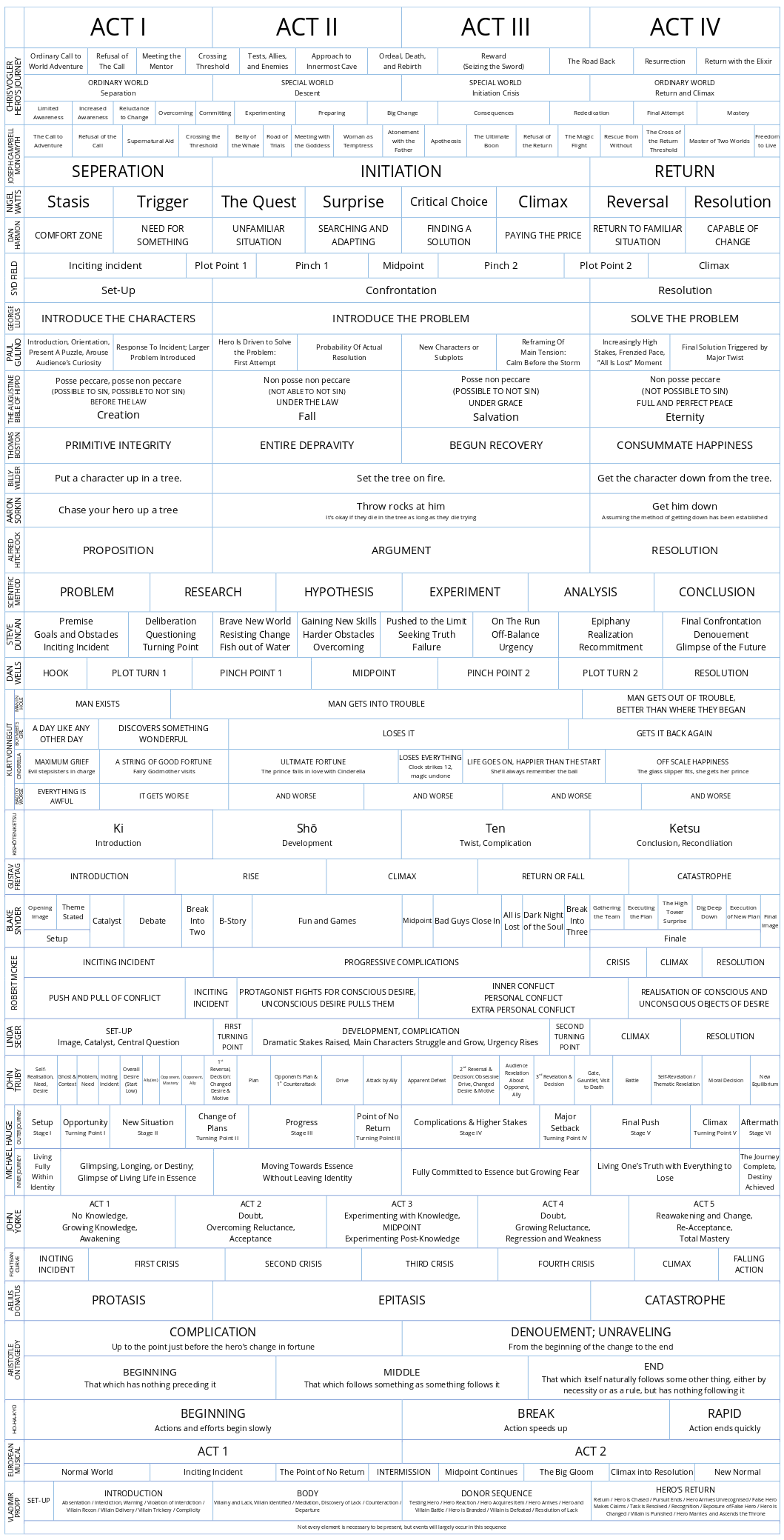
Hey, everybody. Long time no see.
I’m technically still “dark” on social media and Substack since I’m still trying to complete all my ongoing projects. Even so, I wanted to pop in for a quick second to talk about the idea of originality and why I think it’s overrated—especially when it comes to writing fiction or pretty much anything in life. So, if you’re a fiction writer like I am, this post might be particularly relevant for you. If not, I still think you’ll get something out of it.
For now, let me explain what I mean.

Around 13.8 billion years ago, according to NASA and so many other scientists, you and I were probably getting really cozy with each other.
Of course, you and I weren’t exactly the way we are now. Not as human beings or even atoms. We, along with everyone else we know, were just a high-density, high-temperature phenomenon that expanded faster than the speed of light for just a fraction of a second during a period that scientists refer to as cosmic inflation or the “Big Bang”. If I had to describe it in more familiar terms, I’d say that we were something between a 9th-level fireball spell in fifth-edition Dungeons and Dragons and the best primordial and cosmological tomato soup you’ve ever had.
If, of course, you like tomato soup and fifth-edition Dungeons and Dragons. Maybe you don’t like either. Maybe you just like one. In either case, that’s fine.
My point here is that for at least 13.8 billion years, you and I—writer and reader—weren’t original, separate entities. Back then, we likely didn’t even have language, identities, nor even conceptual understanding of these things. And the reason I say “likely” is because according to quantum physics and my love of speculative fiction, I like to think that there might have been other things going on 14.8 billion years ago that we don’t know about. Maybe our universe is draft number 36 in a long line of bad science fiction novels that someone is penning. Maybe there were other things 14.8 or 140.8 billion years ago that we just haven’t discovered yet.
Even then, we all came from somewhere and are, therefore, wholly unoriginal.
Except, that’s not entirely true either. Despite our make-up being wholly unoriginal, our expressions and arrangement of that make-up aren’t.
The first particles formed, became the first nuclei, became the first atoms, became the first stars, became the first galaxies and dark matter, became dark energy, and became us now observing the universe. When people say that we’re made of stardust, it’s not because they want to be poetic. It’s because, according to the Natural History Museum in London, it’s just true. Most of the elements of our bodies were formed in stars over billions of years ago and over countless star lifetimes.
And the beautiful thing is that human beings, mundane objects, plants, animals, waterfalls, planets—All of them are unique expressions of that stardust which is billions of years old. When we look at what’s around us, we’re seeing ourselves. We’re seeing each other. In everything—living or not, breathing or not, imagined or not—there is a trace of our shared cosmic origin.
So, how does this all apply to fiction writing and tomato soup?
Well, the history of the universe is a story in its own right, and a lot of its plot points resemble how human beings are even created. From a confluence of cells and in the span of minutes, an embyro forms into a fetus. It grows in a warm, dark, dense uterus like the primordial tomato soup it inhabits. And just as dark energy forms and encourages the expansion of the universe, so does the growth of the fetus expand inside the womb. Once it leaves the womb and is considered a human child, the cycle might start all over again for them and another, and they might one day look into a telescope to see a distant galaxy whose stars might have granted them the trace elements inside their bodies.
For some, the comparison might be a stretch, but I don’t think it’s too far of one. Ultimately, it brings me to the point that I made earlier about the parts themselves not being original, bur rather their expressions and arrangements.
Put another way, no story in the history of storytelling likely has any purely original content. While I’m not a fan of using imperialist, colonialist ideologies to win arguments, Joseph Campbell’s monomyth of the Hero’s Journey sort of alludes to what I’m talking about with so many stories involving some sort of hero being called to adventure and of them being expected to bring back some sort of knowledge to their home. Of course, his sense of story structure is not the only one out there. And no, there are not only seven basic plots, according to the book of a similar title by Christopher Booker which I have not provided a link for. There are many more storytelling conventions out there from all sorts of different cultures such as the kishōtenketsu framework found within classical Japanese narratives. I mean, there’s this incredible chart first drafted by r/5MadMovieMakers, then improved upon by r/TooMuchBee (both on Reddit). By my count, it’s got 31 sources for story structure—one of which is the scientific method.
So, yeah. Nothing in the entire universe is wholly original except for you—a specific arrangement of elements, atoms, and DNA born in a certain time period that informs your unique sensibilities. No story you ever dare to write will be wholly original except for the ways in which you might approach it and the ways in which you think about it in relation to the literary and sociopolitical contexts around you.
Of course, this is no excuse for you to go out there and try to copy someone’s work word for word on the basis of you thinking it’s yours due to how many atoms and periodic elements you think you share with that other person. That’s not quite how this planet and its inhabitants of ours operates, and copyright infringement is a very real (though rarely enforced) crime.
More importantly, I would encourage you not to get hung up on being original about yourself or your work because perhaps 13.9 billion years ago, on the opposite side of the Big Bang, another Karen A. Parker might have beat you to writing that novel your were thinking of writing. But that Karen A. Parker wouldn’t have written it quite like you would have.
So, write. Write like you’re a burning star, shining light out into the universe toward other galaxies. Write like you’re made of billions of years of stardust. Write like your life is your story.
And live it so that others can, too.











Share this post